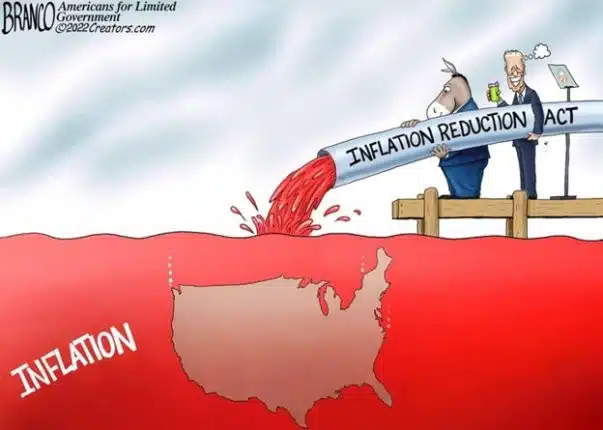 By Rick Manning
By Rick Manning
It is the story that just keeps getting better and better for free marketers. The state of North Dakota has now passed Alaska to become the second largest oil producing state in the nation.
The Bakken Oil Field, which covers the northwest portion of the state along with northeastern Montana and areas in Canada north of the border, is proving itself to be more productive than anyone’s wildest dreams. Years of individual risk taking and human ingenuity are paying off with the end of North America’s dependency upon oil from around the world becoming closer to reality than any political sloganeer might have imagined even five years ago.
In May, the United States Geological Survey (USGS) doubled its estimate of undiscovered and technically recoverable oil in Bakken and the adjacent Three Forks Formation to 7.38 billion barrels of oil.
Even with the upgraded forecast many political and oil and gas industry leaders still believe the USGS is being conservative in its estimate of recoverable reserves.
North Dakota’s Congressman Kevin Cramer flatly states in the Williston Herald News, “What we see in the data from the Three Forks Formation is a direct result of new technologies becoming developed in the energy industry during the last five years.”
Cramer is optimistic that continued advancements in technology will drive estimates released earlier this year northward predicting, “Looking forward, the future holds even greater potential for new discovery thanks to the ingenuity of our developers.”
Note that Cramer does not thank government bureaucrats, lawyers, environmentalists, Energy Department venture socialists or even Al Gore, Jr., but instead lays credit for the new bounty of a world changing energy source to the “ingenuity of our developers.”
Men and women driven by profit motive, not dependent upon the largesse of the federal government’s Department of Energy saved the day. Very smart people, scientists and engineers challenged to use their intellect, without the backstop of a government bailout should they fail, to create technologies that are changing the world’s energy balance of power.
In mid-May, the International Energy Agency Executive Director Maria van der Hoeven said, “North America has set off a supply shock that is sending ripples throughout the world.” She continued by adding, “The good news is that this is helping to ease a market that was relatively tight for several years.”
The result of this easing market is that oil is now hovering around $100 a barrel, well below its 2008 peak of $147, which is good news for consumers not only of gasoline but of all goods produced and transported using oil.
And the acceleration of shale oil recovery efforts using hydraulic fracturing technology has only just begun, with 2000 new wells being projected for the next year, the larger issue is the continued development of pipeline and other infrastructure to deliver the oil from North Dakota to refineries on the east, west and Gulf coasts.
After all, getting it out of the ground doesn’t do any good, if it cannot get to where it is needed.
North Dakota’s junior Senator Heidi Heitkamp understands this issue saying, “Pipeline infrastructure is crucial to the safe and efficient transport of oil and natural gas and I will continue to work in the Senate to push for approval of the Keystone XL pipeline and other crucial energy infrastructure projects. I will also continue to fight against overregulation and work to fix impediments that hurt efficient and effective oil and gas development in the Bakken.”
Beyond Administration and environmentalist attempts to engage in regulatory sabotage of the development of infrastructure necessary to get our nation off the OPEC oil needle, other possible federal actions could be equally injurious.
The North Dakota Department of Mineral Resources identifies congressional Cap and Trade proposals as one of these impediments estimating that they could reduce production by as much as 40 percent. They also estimate some proposed changes to the federal tax law could drive production down by as much as 50 percent.
With as vast as the Bakken Field promises to be, it could be dwarfed in size by shale oil prospects in Utah, Wyoming and Colorado where initial estimates show that as much as 1.8 trillion barrels of oil potential at play in the Green River Formation.
Unlike Bakken, development of this oil resource is largely dependent upon federal government approvals as much of the land has been claimed by the federal government over the years. As the people of Alaska have found out, getting federal government approvals for extracting resources is near impossible, and the development of the Green River Formation stands as a stark contrast to the Bakken man-made miracle.
The Deseret News reports in an article titled, “Feds put clamps on land for oil shale projects,” that the U.S. Department of Interior has effectively taken the development of much of this resource off the table by “sharply reducing the amount of acreage available” for production and potential development.
Utahns decried the federal government decision with Uintah County Commission Chairman saying, “It is a tragedy for our state.” McKee wondered, “Why would the federal government want to put such a stranglehold on this when information shows it is energy-rich communities that are doing the best in this country?”
While the Interior Department used language promising additional approvals when “technology is proven on the ground,” the reality is that if this “research first” approach had been applied to Bakken, the private investment would never have come to develop the technological leaps that made it a major oil field in the first place.
The contrast between the world impacting Bakken development and the federal government foot dragging whenever they get a regulatory voice in the matter exposes the overall poison that is threatening to kill our nation’s standing as the world’s leading economy.
Those who produce goods and services, create jobs, lower energy costs and make our nation thrive can and will succeed when the laws are knowable and reasonable. But that takes the power away from Washington, D.C. and puts it in the hands of those who produce and the markets they serve.
The nature of government is to constantly seek an expansion of its power all in the guise of the public good. This very nature demands that producers pay tribute through hiring the right lobbyists and contributing to the right campaigns and committees in the hopes of tilting the scales in the byzantine world of D.C. politics to allow them to produce and create wealth.
Opposing producers are organizations which have grown powerful simply because they know how to pull the levers of power without the need to show a profit at the end of the day.
Environmentalists worry that their war on extracted energy sources oil, natural gas and coal will be lost due to technologies that allow the profitable extraction of oil not only from shale, but also from tar sands. So, they attack these technologies using scare tactics designed to justify the federal government’s insatiable desire to control all production in the name of the common good.
They attack the pipeline delivery systems with emotional and baseless cries against projects like the Keystone Pipeline. Of course, veterans of these oil wars have seen and heard it before as the same arguments used against Keystone were spouted in opposition to the Alaskan Pipeline more than thirty years earlier.
Politicians and government funded analysts and economists worry about the impact that North American energy independence will have on the balance of world power as the status quo gets uprooted urging more study of these global impacts through grants to their favored institutions.
Those with a stake in alternative energy sources whose profitability is dependent upon extremely expensive oil and natural gas demand that the government take action to prevent these relatively cheap and available new energy sources be taxed, regulated and delayed. All while they cash taxpayer checks to create a new energy future.
Bakken proves that when oil and gas producers are left with reasonable, defined rules for extracting resources, they can create miracles, and that is what scares those whose livelihoods depend upon the false notion that wealth creation requires federal government approval, oversight and planning.
The battle lines are cast between these two divergent visions for our nation’s future. One vision is vibrant, freewheeling, somewhat scary but exciting. The other a moribund future of failed five year plans conceived of and managed by lawyers, regulators and politicians leading to a continued decline of America’s economic might as we descend into a national acceptance that this is as good as it gets.
Bakken and Green River represent two irreconcilable visions for our nation’s future. And like on American Idol, there can only be one winner.
Rick Manning (@rmanning957) is the vice president of public policy and communications for Americans for Limited Government.






